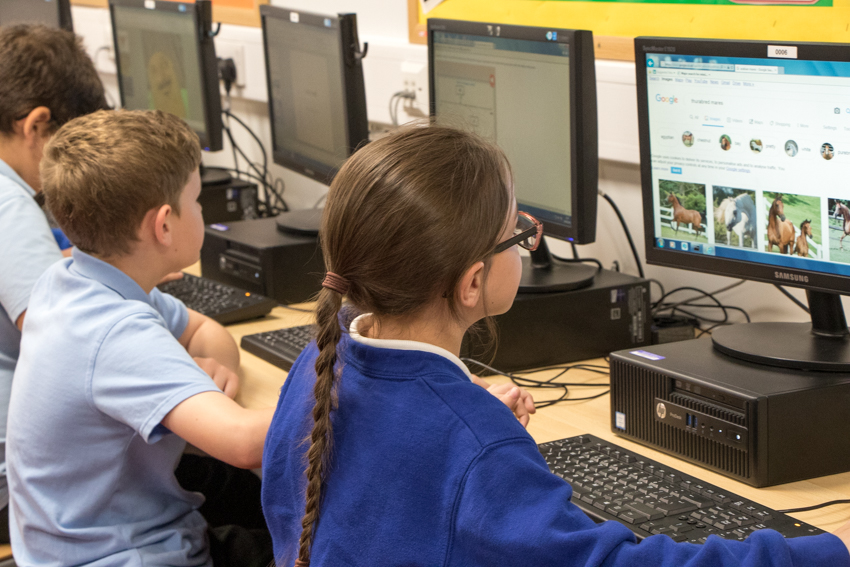Computing

At Bishop Martin CE Primary School our Guiding LIGHT Curriculum is built around the National Curriculum, enriched to reflect the children and community we teach.
We strive to provide a curriculum that is underpinned by our Christian Values, which are embedded in the life and work of our school, and to allow all our children to 'Let their Light Shine'.
Let Your Light Shine Before Others So They May See Your Good Deeds' (Matthew 5.16)
National Curriculum - Purpose of Study
Computers and others technological aids are used throughout the school to support learning. ICT skills are taught as a discrete subject as a means of supporting other areas of the curriculum. The children are encouraged to communicate ideas and information in a variety of forms, where appropriate, using equipment and computer software to enhance their learning.
The aims of the 2014 National Curriculum are for our pupils to:
-
Understand and apply the fundamental principles and concepts of computer science, including abstraction, logic, algorithms and data representation
-
Analyse problems in computational terms, and have repeated practical experience of writing computer programs in order to solve such problems
-
Evaluate and apply information technology, including new or unfamiliar technologies, analytically to solve problems
-
Be responsible, competent, confident and creative users of information and communication technology.
Intent
Our Computing Curriculum intends to ensure that:
By the end of Key Stage 1 pupils will:
-
Understand what algorithms are; how they are implemented as programs on digital devices; and that programs execute by following precise and unambiguous instructions.
-
Create and debug simple programs.
-
Use logical reasoning to predict the behaviour of simple programs.
-
Use technology purposefully to create, organise, store, manipulate and retrieve digital content.
-
Recognise common uses of information technology beyond school.
-
Use technology safely and respectfully, keeping personal information private; identify where to go for help and support when they have concerns about content or contact on the internet or other online technologies.
By the end of Key Stage 2 pupils will:
-
Design, write and debug programs that accomplish specific goals, including controlling or simulating physical systems; solve problems by decomposing them into smaller parts.
-
Use sequence, selection, and repetition in programs; work with variables and various forms of input and output.
-
Use logical reasoning to explain how some simple algorithms work and to detect and correct errors in algorithms and programs.
-
Understand computer networks including the internet; how they can provide multiple services, such as the world wide web; and the opportunities they offer for communication and collaboration.
-
Use search technologies effectively, appreciate how results are selected and ranked, and be discerning in evaluating digital content.
-
Select, use and combine a variety of software (including internet services) on a range of digital devices to design and create a range of programs, systems and content that accomplish given goals, including collecting, analysing, evaluating and presenting data and information.
-
Use technology safely, respectfully and responsibly; recognise acceptable/unacceptable behaviour; identify a range of ways to report concerns about content and contact.
Implementation
Curriculum Planning
At Bishop Martin teachers use the 'Knowsley Scheme of Work', selecting units of work for each year group, to ensure all key skills for mandatory skills, Computer Science, Information Technology and Digital Literacy are covered.
Following the long-term plan, the Subject leader will create unit overviews for each unit of learning, for each year group. These unit overviews show teachers the learning that has come prior and what will follow, as well as key vocabulary; skills; knowledge and the tasks that should be completed to ensure the leaning objectives are achieved.
All medium-term plans are to be adapted by the class teacher to suit the children. This will include personalised adaptations for all SEN and disadvantaged children and children working at greater depth. Short term plans are not expected, however some teachers create their own lesson/ adapt provided PowerPoints and resources to suit the needs of the class. Lessons are monitored by the Computing Subject Leader to ensure coverage of the MTP. In EYFS children will be exposed to a range of age-related technology and content throughout the year.
Computing Subject Overview
Impact
Impact will show through formative assessment throughout the Computing lessons and recording of evidence using 'Book Creator'. This will be used to support and identify specific areas children need to develop. This knowledge will then impact on the daily planning of lessons to support and develop these specific areas.
A summative assessment will also be completed at the end of each term, the children will be assessed against key skills and knowledge covered within that unit which will be used to inform future planning. Teachers then use these systems to support their judgements on askEddi (school assessment system) each half term.
.png)